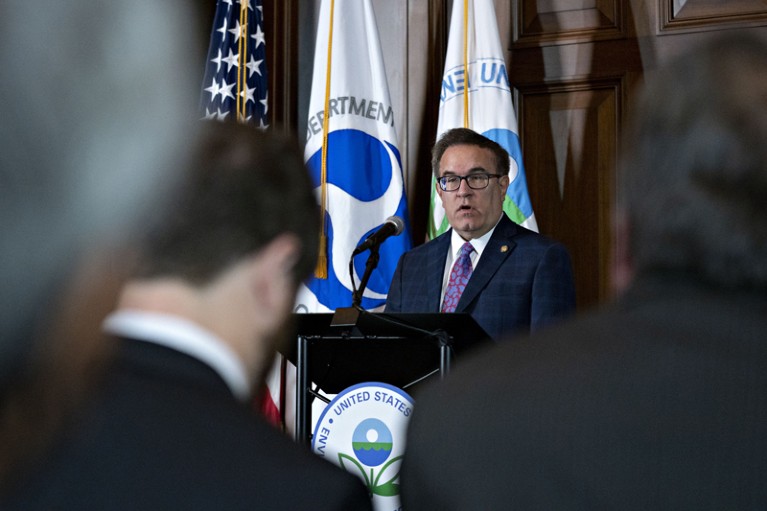
“Are you listening?” Researchers need to keep asking the EPA’s administrator Andrew Wheeler.Credit: Andrew Harrer/Bloomberg/Getty
The US Environmental Protection Agency (EPA) last week surpassed its own recent record of getting publicity for the wrong reasons.
The New York Times revealed that the agency’s leadership is still actively discussing a rule that would require scientists to supply it with the raw data for studies if the findings are to be taken into consideration in the drafting of environmental regulations. The EPA announced its desire for such a rule, which it is calling Strengthening Transparency in Regulatory Science, in April 2018. It is needed, the EPA says, so that the agency can independently reanalyse and revalidate scientific data and models. The EPA says that it will not recognize studies unless scientists agree to supply such data.
Let us consider the implications of such a rule, were it to be adopted. Many of the data that underpin public-health and environmental studies include information about people who will not have consented to disclosing their confidential data, including where they live; their travel habits; their age and gender identity; and the state of their health.
Many such data were integral to the Six Cities study, published in 1993 by what was then the Harvard School of Public Health in Boston, Massachusetts. This work revealed that people living in polluted cities have shorter lives than people in cleaner cities (D. W. Dockery et al. N. Engl. J. Med. 329, 1753–1759; 1993). The results of the Six Cities study led directly to the imposition of life-saving limits on fine particulate matter from emissions. But this research would have been inadmissible under the EPA’s proposed rule.
So the question has to be asked: is there a problem in how science is assessed that needs fixing? Why would the EPA wish to create a rule that could risk worsening human and planetary health? Why would the EPA’s leaders choose to override their own science advisers, who questioned the rule? Even the US Department of Defense said in August 2018 that the absence of underlying data “should not impede the use of otherwise high-quality studies”.
Answers might be found by considering the rule in the context of the wider actions of the administration of President Donald Trump on the environment so far. Whether it’s cancelling the Clean Power Plan — the previous administration’s signature climate policy — withdrawing from the Paris climate agreement, weakening fuel-efficiency standards or cutting back on environmental research, the US administration is choosing to act against the consensus of the scientific community. The Strengthening Transparency in Regulatory Science rule needs to be viewed against the backdrop of this reality.
The EPA has denied that the rule would be applied retrospectively, or to existing environmental standards. That might be true up to a point. But what would happen when existing standards needed to be reviewed — as most periodically are? Would the rule be applied because the reviewed version would be a future standard? And, if so, would any science — new or old — become inadmissible unless the underlying data and models were supplied? The EPA has yet to clarify what would happen in such a scenario, but last week’s revelations had the result of once again uniting the United States’ scientific, medical and health communities, and culminated in a crescendo of opposition.
The scale and volume of this response should rattle the EPA’s leadership, and the response needs to get bigger and louder still. That will compel the agency to conduct more of the discussion around its rule in public, as it is now doing. Institutions and individuals must redouble their efforts. They must write to their elected representatives to call out this attempt to undermine accepted scientific practice in public-health and environmental standards.
The EPA was created to protect the nation’s environment. As it approaches its 50th birthday next year, it must not be allowed to continue on a course of action that will weaken its ability to fulfil that role.

 Air pollution science under siege at US environment agency
Air pollution science under siege at US environment agency
 Science under siege: behind the scenes at Trump’s troubled environment agency
Science under siege: behind the scenes at Trump’s troubled environment agency
 US EPA science advisers question ‘secret science’ rule on data transparency
US EPA science advisers question ‘secret science’ rule on data transparency
 US environment agency pushes to limit its use of non-public data
US environment agency pushes to limit its use of non-public data







